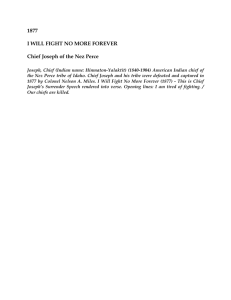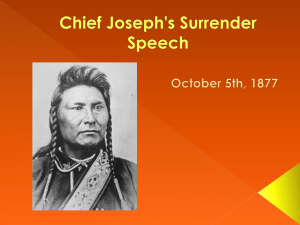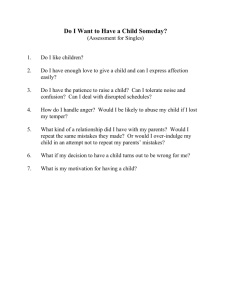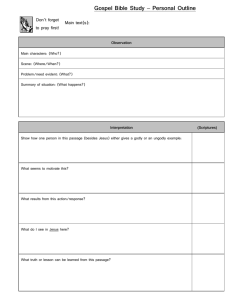thisexamcanbereset2time
advertisement
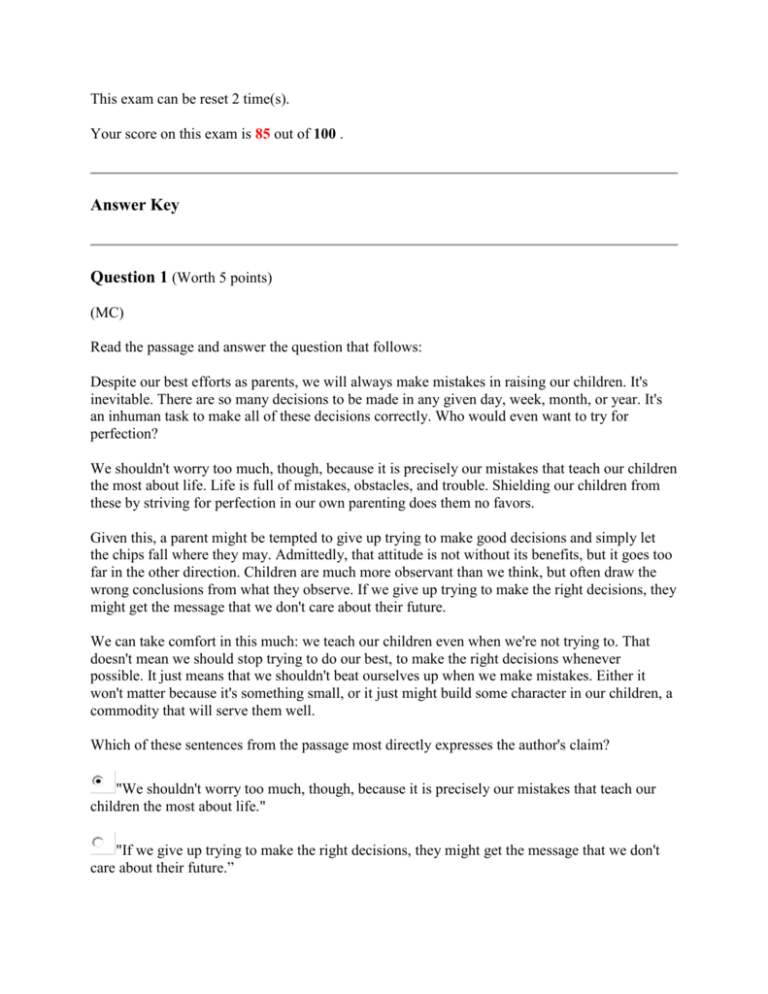
This exam can be reset 2 time(s). Your score on this exam is 85 out of 100 . Answer Key Question 1 (Worth 5 points) (MC) Read the passage and answer the question that follows: Despite our best efforts as parents, we will always make mistakes in raising our children. It's inevitable. There are so many decisions to be made in any given day, week, month, or year. It's an inhuman task to make all of these decisions correctly. Who would even want to try for perfection? We shouldn't worry too much, though, because it is precisely our mistakes that teach our children the most about life. Life is full of mistakes, obstacles, and trouble. Shielding our children from these by striving for perfection in our own parenting does them no favors. Given this, a parent might be tempted to give up trying to make good decisions and simply let the chips fall where they may. Admittedly, that attitude is not without its benefits, but it goes too far in the other direction. Children are much more observant than we think, but often draw the wrong conclusions from what they observe. If we give up trying to make the right decisions, they might get the message that we don't care about their future. We can take comfort in this much: we teach our children even when we're not trying to. That doesn't mean we should stop trying to do our best, to make the right decisions whenever possible. It just means that we shouldn't beat ourselves up when we make mistakes. Either it won't matter because it's something small, or it just might build some character in our children, a commodity that will serve them well. Which of these sentences from the passage most directly expresses the author's claim? "We shouldn't worry too much, though, because it is precisely our mistakes that teach our children the most about life." "If we give up trying to make the right decisions, they might get the message that we don't care about their future.” "We can take comfort in this much: we teach our children even when we're not trying to." "Shielding our children from [mistakes] by striving for perfection in our own parenting does them no favors." Points earned on this question: 0 Question 2 (Worth 5 points) (LC) Which meaning of the root alter helps define the word alternate as it is used in this sentence? Because the traffic was so heavy, they had to take an alternate route to school. Varied Changing Other Shape Points earned on this question: 5 Question 3 (Worth 5 points) (MC) Read the passage and answer the question that follows. Chief Joseph's Surrender Speech, October 5, 1877 by Chief Joseph Tell General Howard I know his heart. What he told me before, I have it in my heart. I am tired of fighting. Our Chiefs are killed; Looking Glass is dead, Ta Hool Hool Shute is dead. The old men are all dead. It is the young men who say yes or no. He who led on the young men is dead. It is cold, and we have no blankets; the little children are freezing to death. My people, some of them, have run away to the hills, and have no blankets, no food. No one knows where they are— perhaps freezing to death. I want to have time to look for my children, and see how many of them I can find. Maybe I shall find them among the dead. Hear me, my Chiefs! I am tired; my heart is sick and sad. From where the sun now stands I will fight no more forever. Chief Joseph was not a war leader, but his actions and this speech cause him to be remembered as one. Why might he be considered a leader in the war? U.S. forces commended his actions. He fought U.S. forces for a long time. He was the one who surrendered to U.S. forces. He rescued his people from their horrible conditions. Points earned on this question: 5 Question 4 (Worth 5 points) (MC) Read the passage and answer the question that follows. Chief Joseph's Surrender Speech, October 5, 1877 by Chief Joseph Tell General Howard I know his heart. What he told me before, I have it in my heart. I am tired of fighting. Our Chiefs are killed; Looking Glass is dead, Ta Hool Hool Shute is dead. The old men are all dead. It is the young men who say yes or no. He who led on the young men is dead. It is cold, and we have no blankets; the little children are freezing to death. My people, some of them, have run away to the hills, and have no blankets, no food. No one knows where they are— perhaps freezing to death. I want to have time to look for my children, and see how many of them I can find. Maybe I shall find them among the dead. Hear me, my Chiefs! I am tired; my heart is sick and sad. From where the sun now stands I will fight no more forever. What is the speaker’s main argument? He will not fight anymore because his way of life is gone. His community will rebuild itself. His people are in disagreement about the surrender. He will convince the people to listen to the young men. Points earned on this question: 5 Question 5 (Worth 5 points) (MC) Read the excerpt from Julius Caesar and answer the question that follows. Brutus It must be by his death, and for my part I know no personal cause to spurn at him But for the general. He would be crowned. How that might change his nature, there’s the question. It is the bright day that brings forth the adder And that craves wary walking. Crown him that, And then I grant we put a sting in him That at his will he may do danger with. Th' abuse of greatness is when it disjoins Remorse from power. And, to speak truth of Caesar, I have not known when his affections swayed More than his reason. But ’tis a common proof That lowliness is young ambition’s ladder, Whereto the climber upward turns his face. But when he once attains the upmost round, He then unto the ladder turns his back, Looks in the clouds, scorning the base degrees By which he did ascend. So Caesar may. Then, lest he may, prevent. And since the quarrel Will bear no color for the thing he is, Fashion it thus: that what he is, augmented, Would run to these and these extremities. And therefore think him as a serpent’s egg— Which, hatched, would as his kind grow mischievous— And kill him in the shell. Which of these lines from the play indicates that Brutus fears Caesar will become a corrupt ruler? "It must be by his death, and for my part/I know no personal cause to spurn at him" "And, to speak truth of Caesar/I have not known when his affections swayed/More than his reason." "But ’tis a common proof/That lowliness is young ambition’s ladder," "Crown him that,/And then I grant we put a sting in him/That at his will he may do danger with." Points earned on this question: 5 Question 6 (Worth 5 points) (MC) Read the excerpt from Julius Caesar and answer the question that follows. Brutus It must be by his death, and for my part I know no personal cause to spurn at him But for the general. He would be crowned. How that might change his nature, there’s the question. It is the bright day that brings forth the adder And that craves wary walking. Crown him that, And then I grant we put a sting in him That at his will he may do danger with. Th' abuse of greatness is when it disjoins Remorse from power. And, to speak truth of Caesar, I have not known when his affections swayed More than his reason. But ’tis a common proof That lowliness is young ambition’s ladder, Whereto the climber upward turns his face. But when he once attains the upmost round, He then unto the ladder turns his back, Looks in the clouds, scorning the base degrees By which he did ascend. So Caesar may. Then, lest he may, prevent. And since the quarrel Will bear no color for the thing he is, Fashion it thus: that what he is, augmented, Would run to these and these extremities. And therefore think him as a serpent’s egg— Which, hatched, would as his kind grow mischievous— And kill him in the shell. Which of these lines from the play indicates that Brutus fears power will change Caesar? "And, to speak truth of Caesar/I have not known when his affections swayed/More than his reason." "But when he once attains the upmost round,/He then unto the ladder turns his back" "It must be by his death, and for my part/I know no personal cause to spurn at him" "But ’tis a common proof/That lowliness is young ambition’s ladder," Points earned on this question: 5 Question 7 (Worth 5 points) (MC) Read the passage and answer the question that follows. Chief Joseph's Surrender Speech, October 5, 1877 by Chief Joseph Tell General Howard I know his heart. What he told me before, I have it in my heart. I am tired of fighting. Our Chiefs are killed; Looking Glass is dead, Ta Hool Hool Shute is dead. The old men are all dead. It is the young men who say yes or no. He who led on the young men is dead. It is cold, and we have no blankets; the little children are freezing to death. My people, some of them, have run away to the hills, and have no blankets, no food. No one knows where they are— perhaps freezing to death. I want to have time to look for my children, and see how many of them I can find. Maybe I shall find them among the dead. Hear me, my Chiefs! I am tired; my heart is sick and sad. From where the sun now stands I will fight no more forever. What impact does the repetition of the phrase "is dead" have on the passage? It emphasizes the loss of leadership among Chief Joseph's people. It acknowledges the superiority of Chief Joseph's enemies. It points to the defiant spirit of Chief Joseph and his people. It is meant to inspire the audience to take revenge on Chief Joseph's enemies. Points earned on this question: 5 Question 8 (Worth 5 points) (LC) Read the passage and answer the question that follows. Despite my knowledge that too much TV-watching isn't good for me, my favorite thing to do is watch television. I understand that I have to experience life and learn about the world in different ways. I know all of this; however, I still find it difficult to pull myself away from the television unless there's something very pressing that I have to handle. Which phrase from the passage acknowledges a contrasting thought and signals that the author will repeat the main point? "Despite my knowledge" "I understand that" "I know all of this" "however, I still" Points earned on this question: 5 Question 9 (Worth 5 points) (LC) Read the passage and answer the question that follows. No matter what people say, every act of kindness is in fact purely selfish. Even large gifts to charity feel good to the giver. Whatever beneficial effects to others these gifts produce, it is the personal satisfaction that motivates them. However, this does not mean that charity does no good. On the contrary, selfishly motivated giving has done a lot of good in the world. Which word or phrase from the passage signals a contrasting thought? "No matter" "Whatever" "However" "On the contrary" Points earned on this question: 5 Question 10 (Worth 5 points) (MC) Read the passage and answer the question that follows. Chief Joseph's Surrender Speech, October 5, 1877 by Chief Joseph Tell General Howard I know his heart. What he told me before, I have it in my heart. I am tired of fighting. Our Chiefs are killed; Looking Glass is dead, Ta Hool Hool Shute is dead. The old men are all dead. It is the young men who say yes or no. He who led on the young men is dead. It is cold, and we have no blankets; the little children are freezing to death. My people, some of them, have run away to the hills, and have no blankets, no food. No one knows where they are— perhaps freezing to death. I want to have time to look for my children, and see how many of them I can find. Maybe I shall find them among the dead. Hear me, my Chiefs! I am tired; my heart is sick and sad. From where the sun now stands I will fight no more forever. What is the speaker's overall point in this passage? He is surrendering because the winter's cold has killed many of his people. He is surrendering because so many of his tribe's elders have passed away. He is surrendering because his people's lives are more important than their freedom. He is surrendering because his people have been overwhelmed by superior U.S. forces. Points earned on this question: 5 Question 11 (Worth 5 points) (LC) Read the passage and answer the question that follows: Despite our best efforts as parents, we will always make mistakes in raising our children. It's inevitable. There are so many decisions to be made in any given day, week, month, or year. It's an inhuman task to make all of these decisions correctly. Who would even want to try for perfection? We shouldn't worry too much, though, because it is precisely our mistakes that teach our children the most about life. Life is full of mistakes, obstacles, and trouble. Shielding our children from these by striving for perfection in our own parenting does them no favors. Given this, a parent might be tempted to give up trying to make good decisions and simply let the chips fall where they may. Admittedly, that attitude is not without its benefits, but it goes too far in the other direction. Children are much more observant than we think, but often draw the wrong conclusions from what they observe. If we give up trying to make the right decisions, they might get the message that we don't care about their future. We can take comfort in this much: we teach our children even when we're not trying to. That doesn't mean we should stop trying to do our best, to make the right decisions whenever possible. It just means that we shouldn't beat ourselves up when we make mistakes. Either it won't matter because it's something small, or it just might build some character in our children, a commodity that will serve them well. Which of the following could the author add to make this argument stronger? Factual evidence to support the counterclaim Factual evidence to support the claim An easy to follow structure More transitional words Points earned on this question: 5 Question 12 (Worth 5 points) (LC) Read the excerpt and look closely at the image to answer the question that follows. from "The Lady of Shalott" by Alfred, Lord Tennyson In the stormy east-wind straining, The pale-yellow woods were waning, The broad stream in his banks complaining, Heavily the low sky raining Over tower'd Camelot; Down she came and found a boat Beneath a willow left afloat, And round about the prow she wrote The Lady of Shalott. And down the river's dim expanse— Like some bold seër in a trance, Seeing all his own mischance— With a glassy countenance Did she look to Camelot. And at the closing of the day She loosed the chain, and down she lay; The broad stream bore her far away, The Lady of Shalott. Public Domain Stanza 1 In the stormy east-wind straining, The pale-yellow woods were waning, The broad stream in his banks complaining, Heavily the low sky raining Over tower'd Camelot; Down she came and found a boat Beneath a willow left afloat, And round about the prow she wrote The Lady of Shalott. The scenes depicted in this stanza from the poem and in the painting are similar because they both provide detailed information about the setting similar because they both provide detailed information about the lady different because the poem focuses on the lady and the painting focuses on the setting different because the painting does not provide information about the setting and the poem does Points earned on this question: 5 Question 13 (Worth 5 points) (MC) Read the passage and answer the question that follows. Chief Joseph's Surrender Speech, October 5, 1877 by Chief Joseph Tell General Howard I know his heart. What he told me before, I have it in my heart. I am tired of fighting. Our Chiefs are killed; Looking Glass is dead, Ta Hool Hool Shute is dead. The old men are all dead. It is the young men who say yes or no. He who led on the young men is dead. It is cold, and we have no blankets; the little children are freezing to death. My people, some of them, have run away to the hills, and have no blankets, no food. No one knows where they are— perhaps freezing to death. I want to have time to look for my children, and see how many of them I can find. Maybe I shall find them among the dead. Hear me, my Chiefs! I am tired; my heart is sick and sad. From where the sun now stands I will fight no more forever. What does the speaker say about the "old men"? The old men make the young people blankets and warm clothes. Because the old men have died, the young have to make decisions. The speaker's tribe requires that the old always go before the young. Because of their experience, the old men are now giving the young advice. Points earned on this question: 5 Question 14 (Worth 5 points) (LC) Read the passage and answer the question that follows: Despite our best efforts as parents, we will always make mistakes in raising our children. It's inevitable. There are so many decisions to be made in any given day, week, month, or year. It's an inhuman task to make all of these decisions correctly. Who would even want to try for perfection? We shouldn't worry too much, though, because it is precisely our mistakes that teach our children the most about life. Life is full of mistakes, obstacles, and trouble. Shielding our children from these by striving for perfection in our own parenting does them no favors. Given this, a parent might be tempted to give up trying to make good decisions and simply let the chips fall where they may. Admittedly, that attitude is not without its benefits, but it goes too far in the other direction. Children are much more observant than we think, but often draw the wrong conclusions from what they observe. If we give up trying to make the right decisions, they might get the message that we don't care about their future. We can take comfort in this much: we teach our children even when we're not trying to. That doesn't mean we should stop trying to do our best, to make the right decisions whenever possible. It just means that we shouldn't beat ourselves up when we make mistakes. Either it won't matter because it's something small, or it just might build some character in our children, a commodity that will serve them well. "Despite our best efforts as parents, we will always make mistakes in raising our children." What word in this sentence indicates a relationship? Always Despite Best Will Points earned on this question: 5 Question 15 (Worth 5 points) (LC) And down the river's dim expanse— Like some bold seër in a trance, Seeing all his own mischance— With a glassy countenance Did she look to Camelot. And at the closing of the day She loosed the chain, and down she lay; The broad stream bore her far away, The Lady of Shalott. Lying, robed in snowy white That loosely flew to left and right— The leaves upon her falling light— Thro' the noises of the night She floated down to Camelot: And as the boat-head wound along The willowy hills and fields among, They heard her singing her last song, The Lady of Shalott. Public Domain Based on the details provided in the poem and in the painting, the Lady of Shalott is most likely joyful lonely excited angry Points earned on this question: 5 Question 16 (Worth 5 points) (LC) Identify the infinitive phrase in the following sentence: The teacher's plan to go on a field trip was foiled by rain. The teacher's plan to go on a field trip was foiled by rain Points earned on this question: 5 Question 17 (Worth 5 points) (MC) Read the passage and answer the question that follows: Despite our best efforts as parents, we will always make mistakes in raising our children. It's inevitable. There are so many decisions to be made in any given day, week, month, or year. It's an inhuman task to make all of these decisions correctly. Who would even want to try for perfection? We shouldn't worry too much, though, because it is precisely our mistakes that teach our children the most about life. Life is full of mistakes, obstacles, and trouble. Shielding our children from these by striving for perfection in our own parenting does them no favors. Given this, a parent might be tempted to give up trying to make good decisions and simply let the chips fall where they may. Admittedly, that attitude is not without its benefits, but it goes too far in the other direction. Children are much more observant than we think, but often draw the wrong conclusions from what they observe. If we give up trying to make the right decisions, they might get the message that we don't care about their future. We can take comfort in this much: we teach our children even when we're not trying to. That doesn't mean we should stop trying to do our best, to make the right decisions whenever possible. It just means that we shouldn't beat ourselves up when we make mistakes. Either it won't matter because it's something small, or it just might build some character in our children, a commodity that will serve them well. Which of these best describes the audience this author is speaking to? People who are considering becoming parents People who do not want to have children People who are concerned about their parenting ability People who have children who misbehave Points earned on this question: 5 Question 18 (Worth 5 points) (MC) Read the passage and answer the question that follows. Chief Joseph's Surrender Speech, October 5, 1877 by Chief Joseph Tell General Howard I know his heart. What he told me before, I have it in my heart. I am tired of fighting. Our Chiefs are killed; Looking Glass is dead, Ta Hool Hool Shute is dead. The old men are all dead. It is the young men who say yes or no. He who led on the young men is dead. It is cold, and we have no blankets; the little children are freezing to death. My people, some of them, have run away to the hills, and have no blankets, no food. No one knows where they are— perhaps freezing to death. I want to have time to look for my children, and see how many of them I can find. Maybe I shall find them among the dead. Hear me, my Chiefs! I am tired; my heart is sick and sad. From where the sun now stands I will fight no more forever. How does Chief Joseph demonstrate that he cares more about his people than about himself? He gets U.S. forces to search for them. He puts their lives ahead of his own freedom. He agrees to be punished for their wrongdoings. He spends all his money on new clothes and blankets for them. Points earned on this question: 5 Question 19 (Worth 5 points) (LC) Read the passage from 1 Henry VI (act 2, scene 3) and answer the question that follows. Is this the scourge of France? Is this the Talbot, so much fear'd abroad That with his name the mothers still their babes? I see report is fabulous and false: I thought I should have seen some Hercules, A second Hector, for his grim aspect, And large proportion of his strong-knit limbs. Alas, this is a child, a silly dwarf! It cannot be this weak and writhled shrimp Should strike such terror to his enemies. In Greek mythology, Hector was the greatest fighter in the city of Troy. Hercules was a fictional Roman hero known for his strength and far-ranging adventures. What do the references to Hercules and Hector reveal about Talbot? They describe Talbot as strong like the two heroes. They highlight Talbot’s weakness in comparison to the two heroes. They show Talbot preparing for war like the two heroes. They explain why Talbot is feared like the two heroes. Points earned on this question: 0 Question 20 (Worth 5 points) (LC) Which passage uses MLA in-text citation properly? Voltaire wrote that Candide "had one great advantage over Martin." Martin had no hope (77). Voltaire wrote that Candide "had one great advantage over Martin." Martin had no hope. (pg 77) Voltaire wrote that Candide "had one great advantage over Martin." Martin had no hope (Voltaire, 77). Voltaire wrote that Candide "had one great advantage over Martin." Martin had no hope, (77.) Points earned on this question: 0 Bottom of Form
